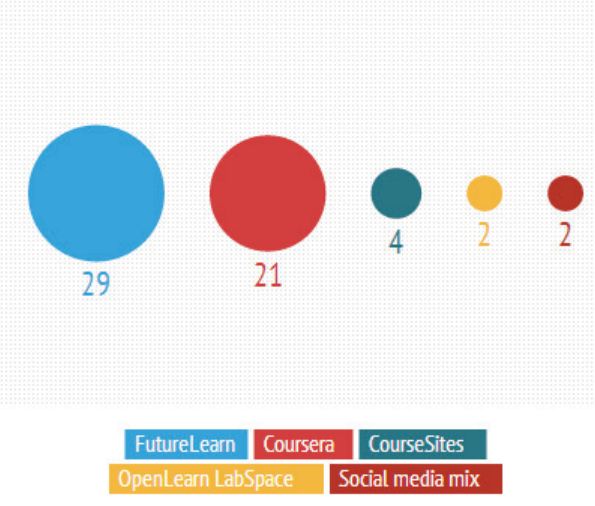
The phenomenon of Massive Open Online Courses, or MOOCs, has attracted a great deal of reportage, debate and research over the past two years. As learning and teaching in higher education continues to be high on the agenda of UK governments, higher education providers and policy makers alike, it is vital that this aspect of one of the most significant developments in higher education in recent years receives attention.
UK MOOC scene is currently undergoing a period of significant growth.
As the activities of the early UK MOOC innovators extend and start to become mainstream (via new iterations of existing MOOCs, the launch of the UK MOOC platform FutureLearn, the expansion of existing platform partnerships, and the emergence of new platform options), there is value in offering a portrait of ‘where we are now’ at this turning point for MOOC engagement within UK higher education.
Here we have elected to focus on another of the UK Higher Education Academy’s core concerns: the provision of evidence-informed support for the development of pedagogic practice across the disciplines. In doing so, we aim to engage not with macro-level debate largely characterised by MOOC hype and MOOC backlash, but rather with the current micro-practices of MOOC teachers, and what these might mean for the role and place of online teaching in the open and at scale.
As the national body for learning and teaching in higher education, the Higher Education Academy (HEA) has been involved with MOOCS since their earliest implementation: the first MOOC to be named as such was the part-HEA-funded Oxford Brookes course “First Steps into Learning and Teaching in Higher Education” (May-June 2012). In 2013 this course included an option for gaining credit for its completion.
As at the end of 2013, 25 MOOCs had run in the UK, five of them at least twice, and as the fast-moving MOOC landscape shifts once again with the recent announcement of the first courses to be offered through the Open University’s FutureLearn platform.
The emergence and current state of play of MOOCs in the UK is described here, alongside a time line of MOOC delivery from UK universities. We trace the growth of the UK MOOC offer from the first MOOC to be named as such (the part-HEAfunded Oxford Brookes course ‘First Steps into Learning and Teaching in Higher Education’, May-June 2012), through the launch of the first big Coursera MOOCs (the University of Edinburgh MOOCs, Feb-March 2013), and the announcement of the first waves of courses offered through the UK FutureLearn platform (Oct 2013-Feb 2014).
In summary:
- Fifty-eight MOOCs are currently offered by UK universities
- Twenty-nine of these are on FutureLearn, 21 on Coursera and eight are offered without platform partnership, using CourseSites, OpenLearn and social media
- The dominant disciplinary area of offer is Social Science (18 MOOCs), with Humanities and Medical and Veterinary Science each having 13 MOOCs; Natural Sciences offering eight, and Computing Sciences six
- MOOC durations are between two weeks and 12 weeks; the majority category is six weeks in length
- Two UK MOOCs are currently offered for credit: First Steps in Learning and Teaching (Oxford Brookes University) and Vampire Fictions (Edge Hill University).
In October 2013 the University of Central Lancashire announced it would welcome students and applicants using MOOCs as evidence of prior learning, providing its own assignments to test understanding of the equivalent course material (Parr 2013). It is particularly important to consider the implications that such innovations may have on a range of notions of ‘openness’; accreditation comes along with particular expectations about the processes of designing and teaching the MOOC, and expectations about participation. These expectations may work against certain ideas of ‘openness’, a matter that is discussed in the literature review.
At the end of 2013, 25 MOOCs have been run by UK universities, and five of these have run at least twice. Another 33 are currently being marketed for 2014 via Coursera and FutureLearn.
Enrolments in courses run to date have ranged from a few hundred (for example, First Steps in Learning and Teaching, Oxford Brookes University) to 97,000 (Introduction to Philosophy, University of Edinburgh). Eight of the UK MOOCs offered to date have been built outside the major platforms, via a social media mix, using CourseSites or the OpenLearn LabSpace, with the rest either taking place in Coursera or FutureLearn. No UK universities currently offer through the other current major US platforms EdX and Udacity.

The disciplinary mix of the UK offer is notable, with a relatively high proportion of courses being offered in the Humanities and Social Sciences. Courses tend to be short, with six-week courses being the largest grouping.
Note: Article idea and some texts are taken from: The pedagogy of the Massive Open Online Course: the UK view Siân Bayne and Jen Ross, the University of Edinburgh. ‘https://www.heacademy.ac.uk/system/files/hea_edinburgh_mooc_web_240314_1.pdf‘.

